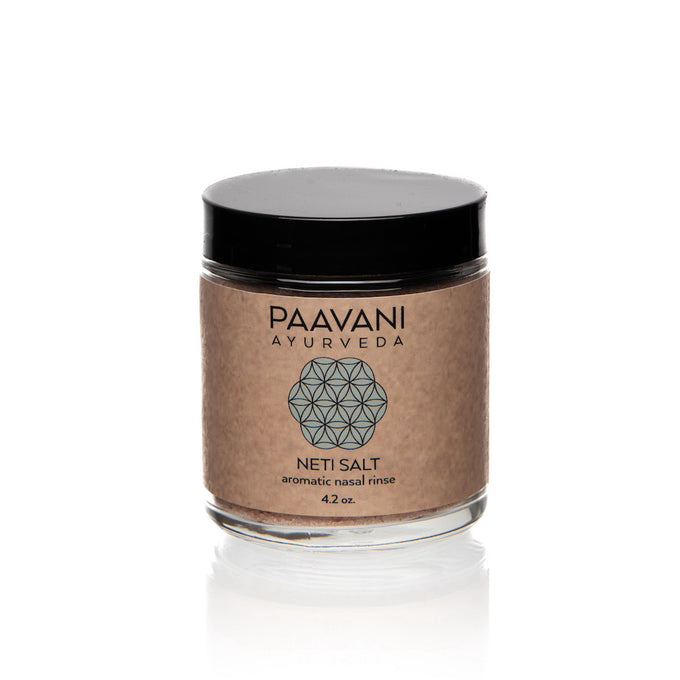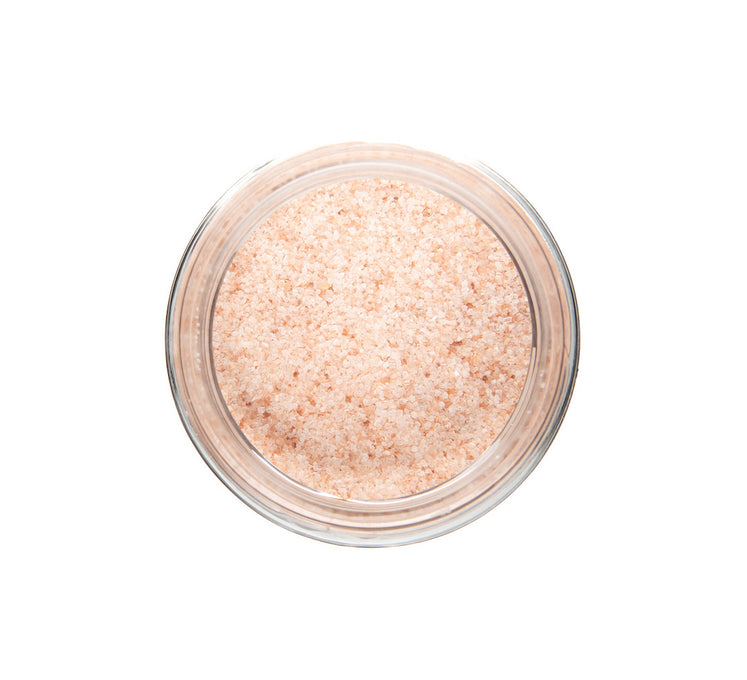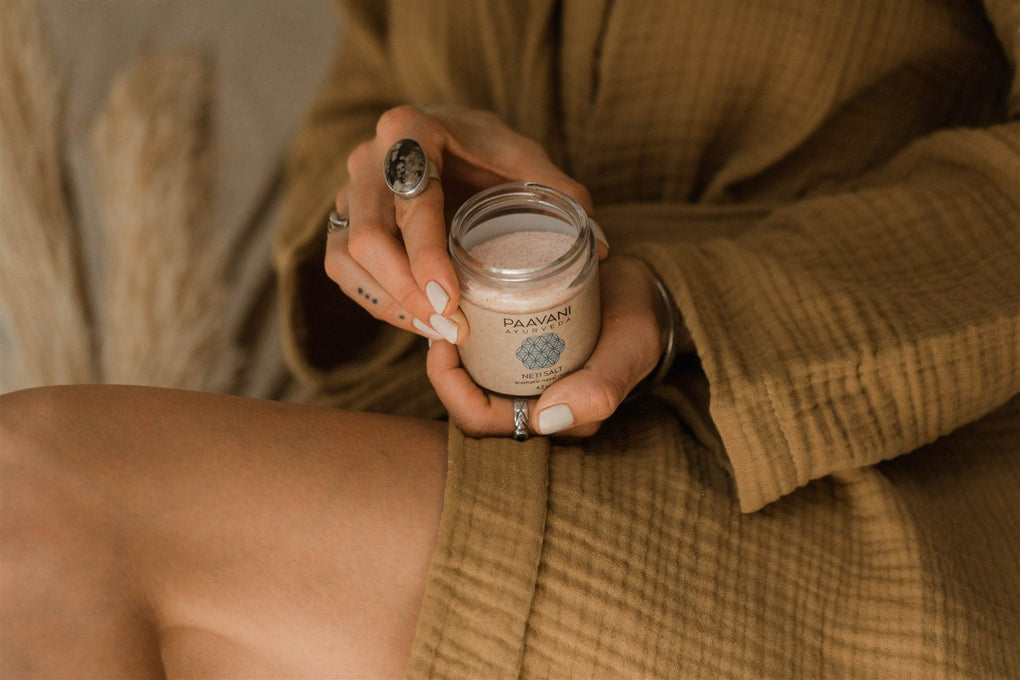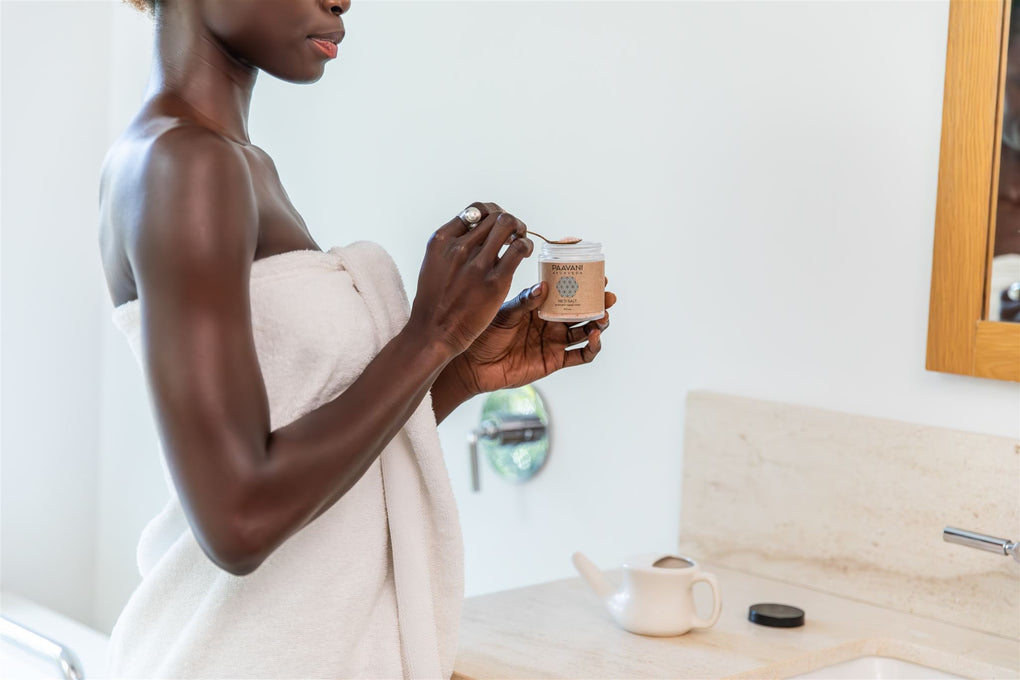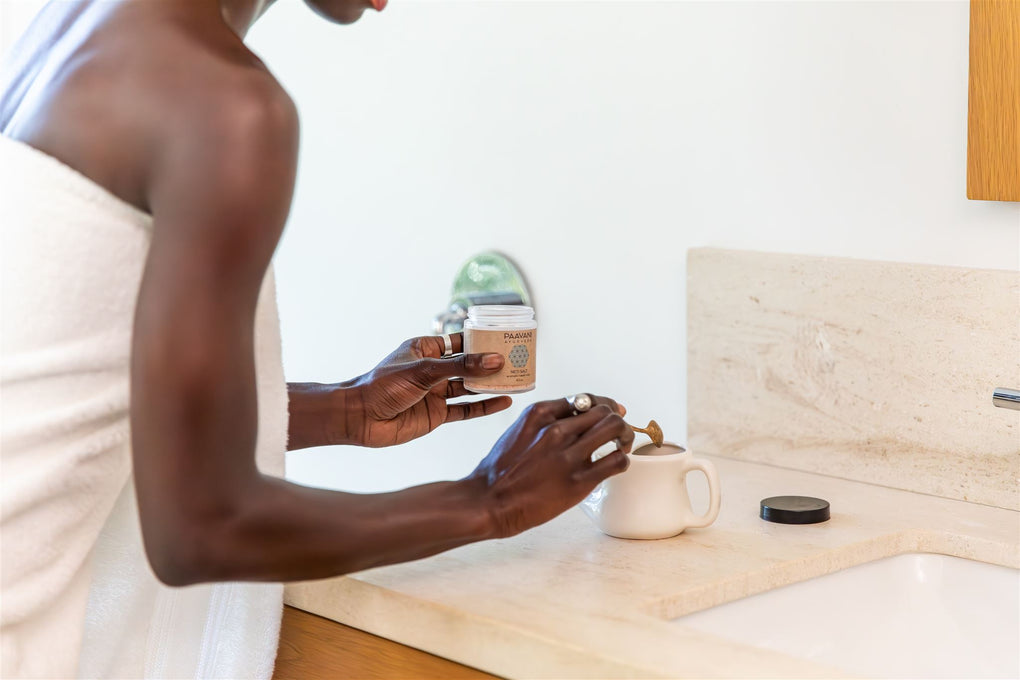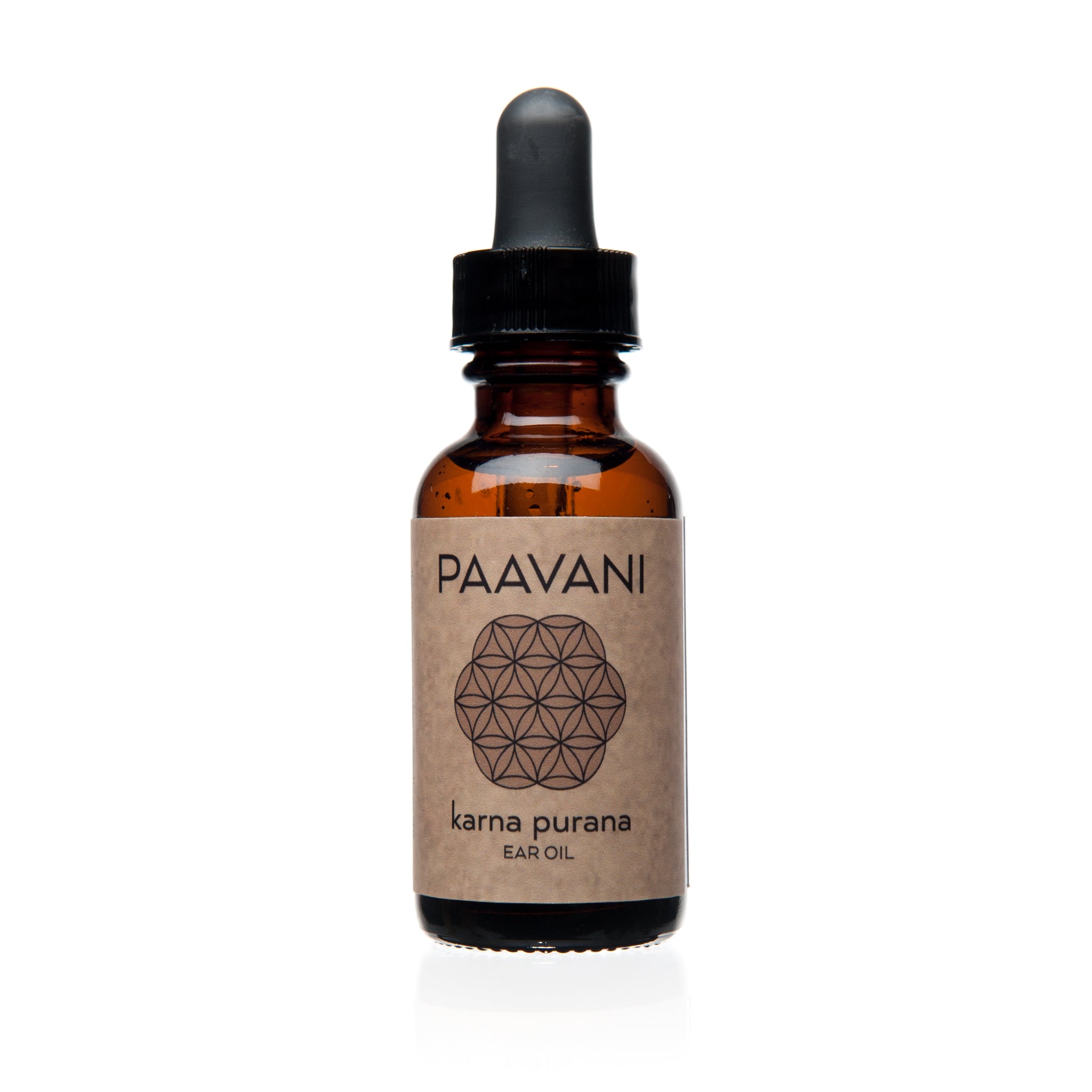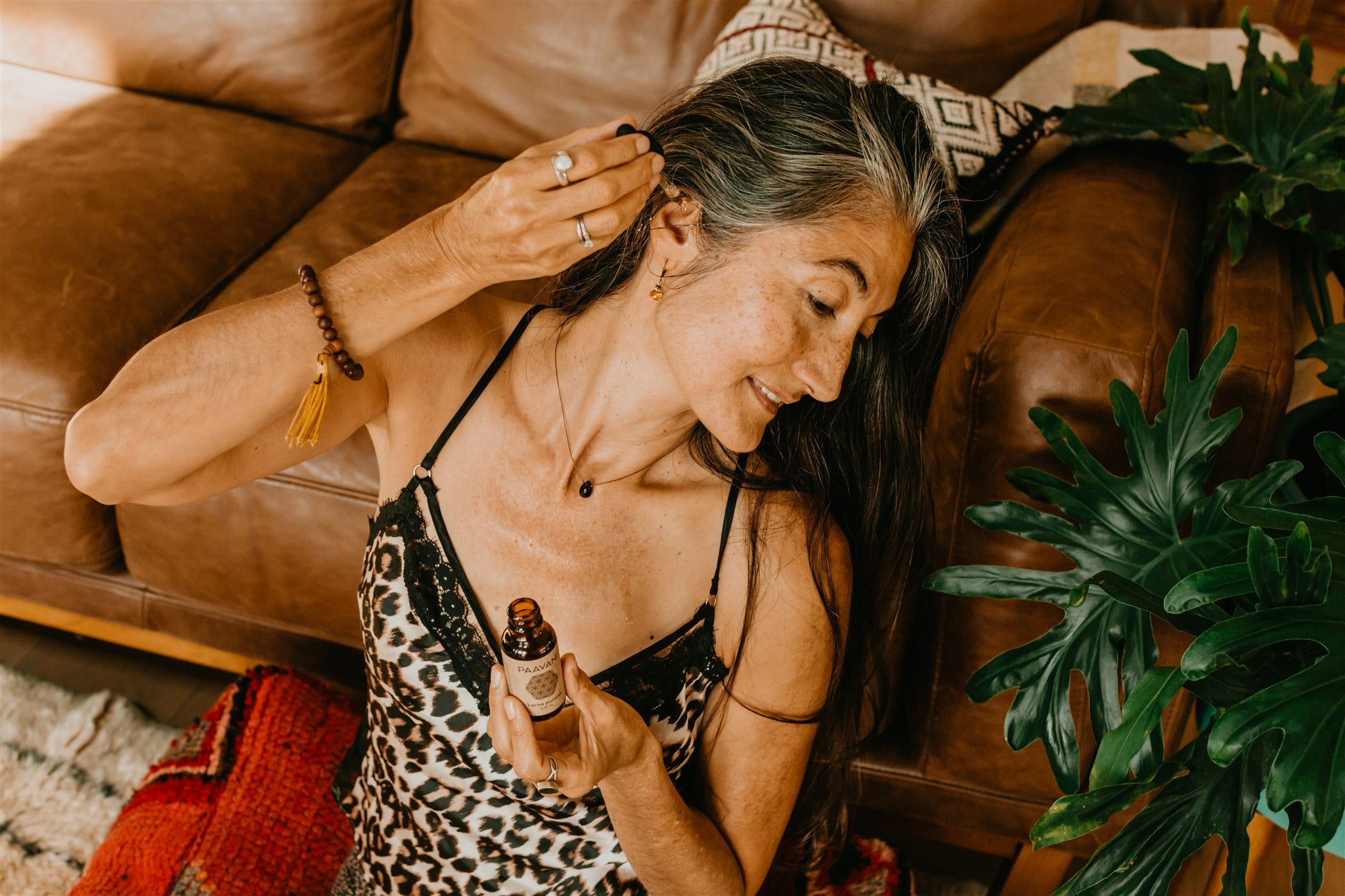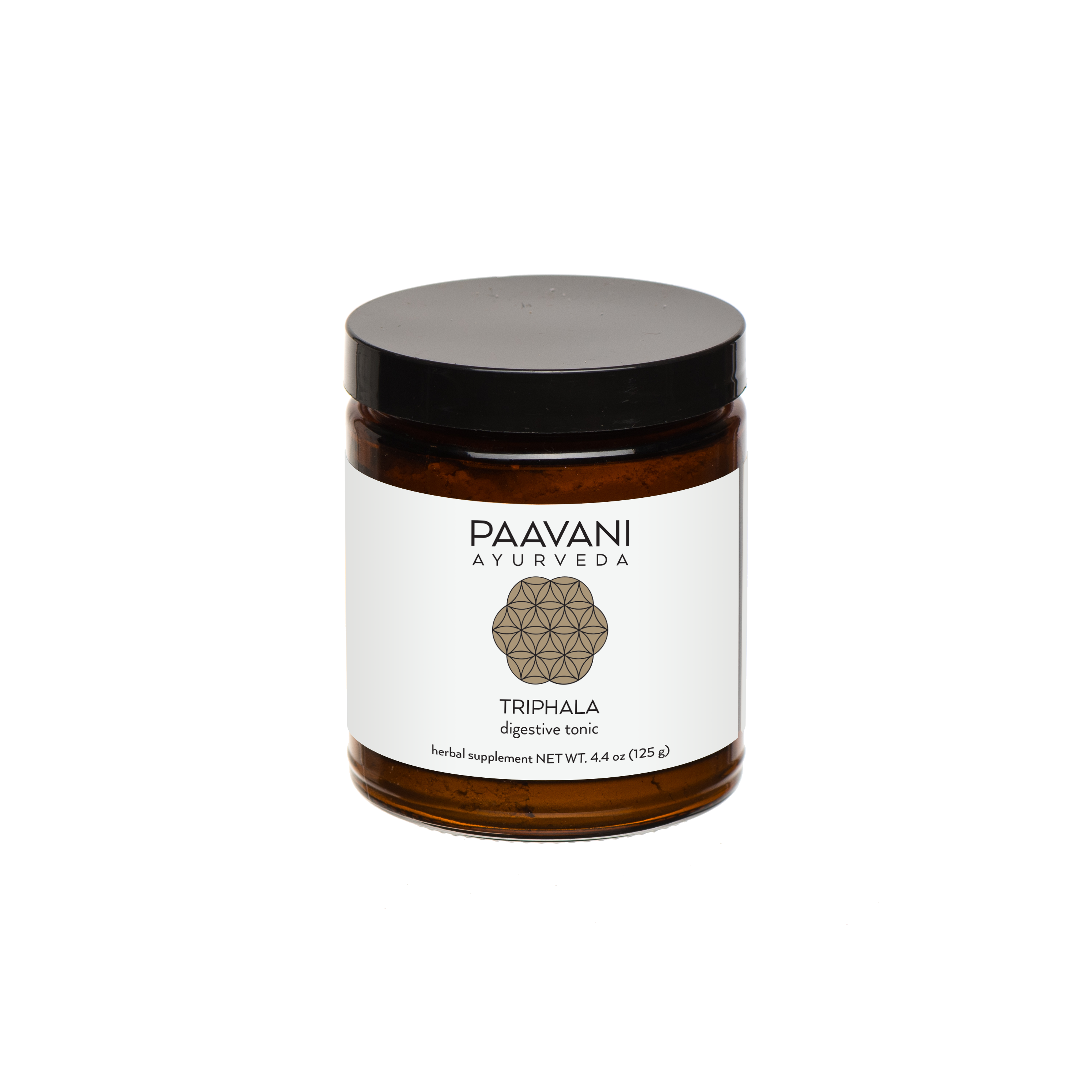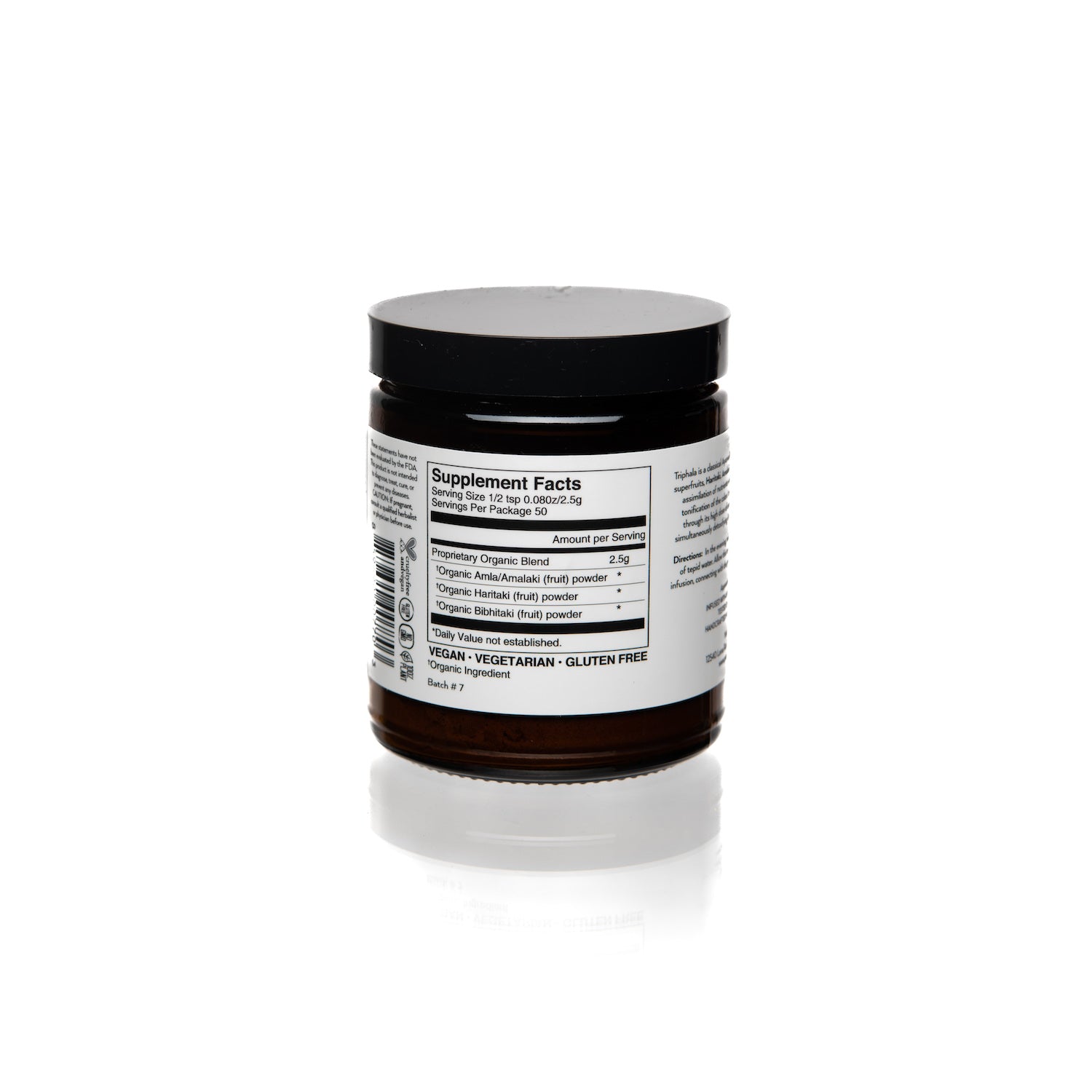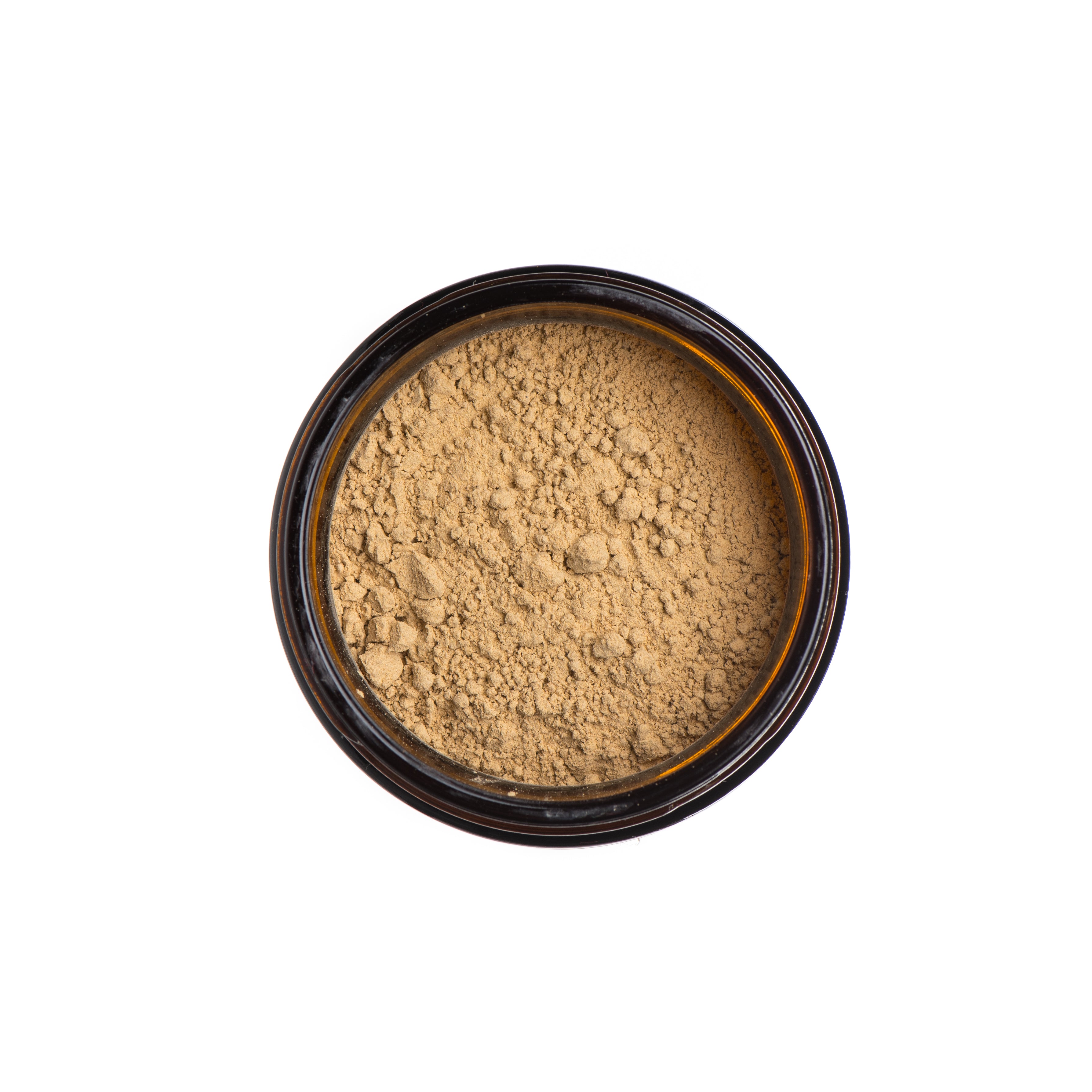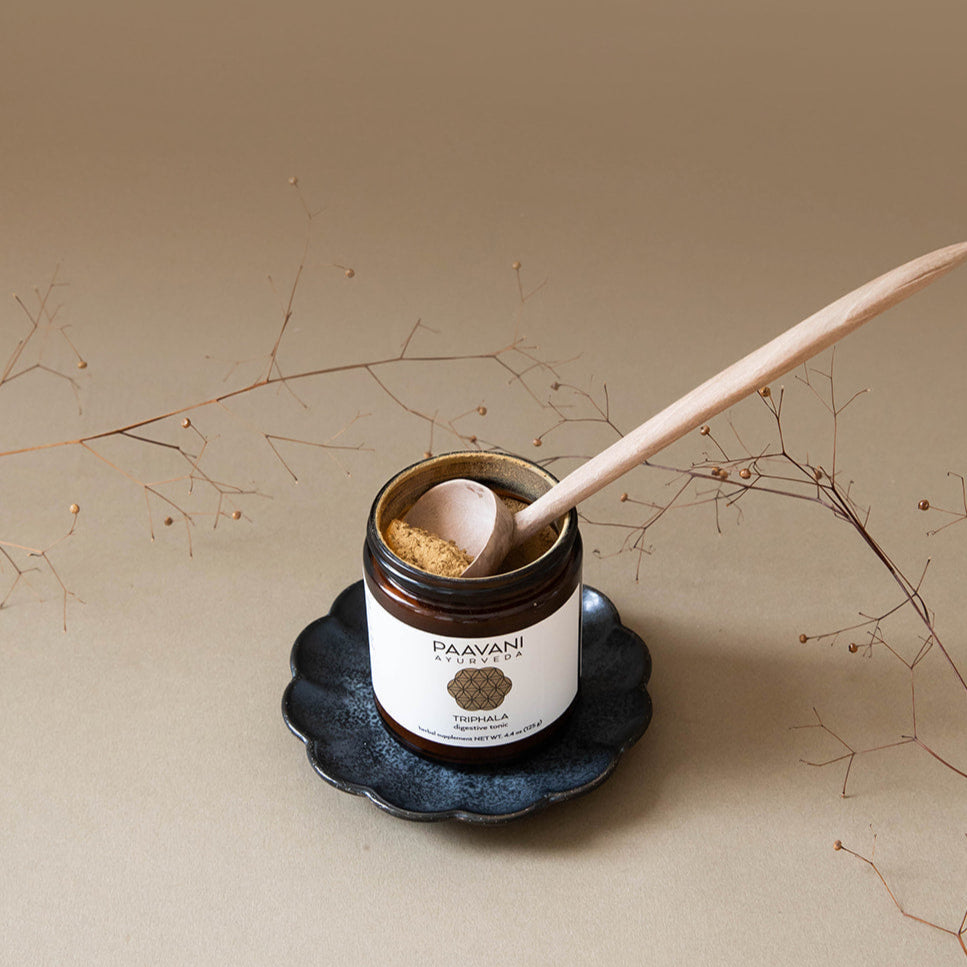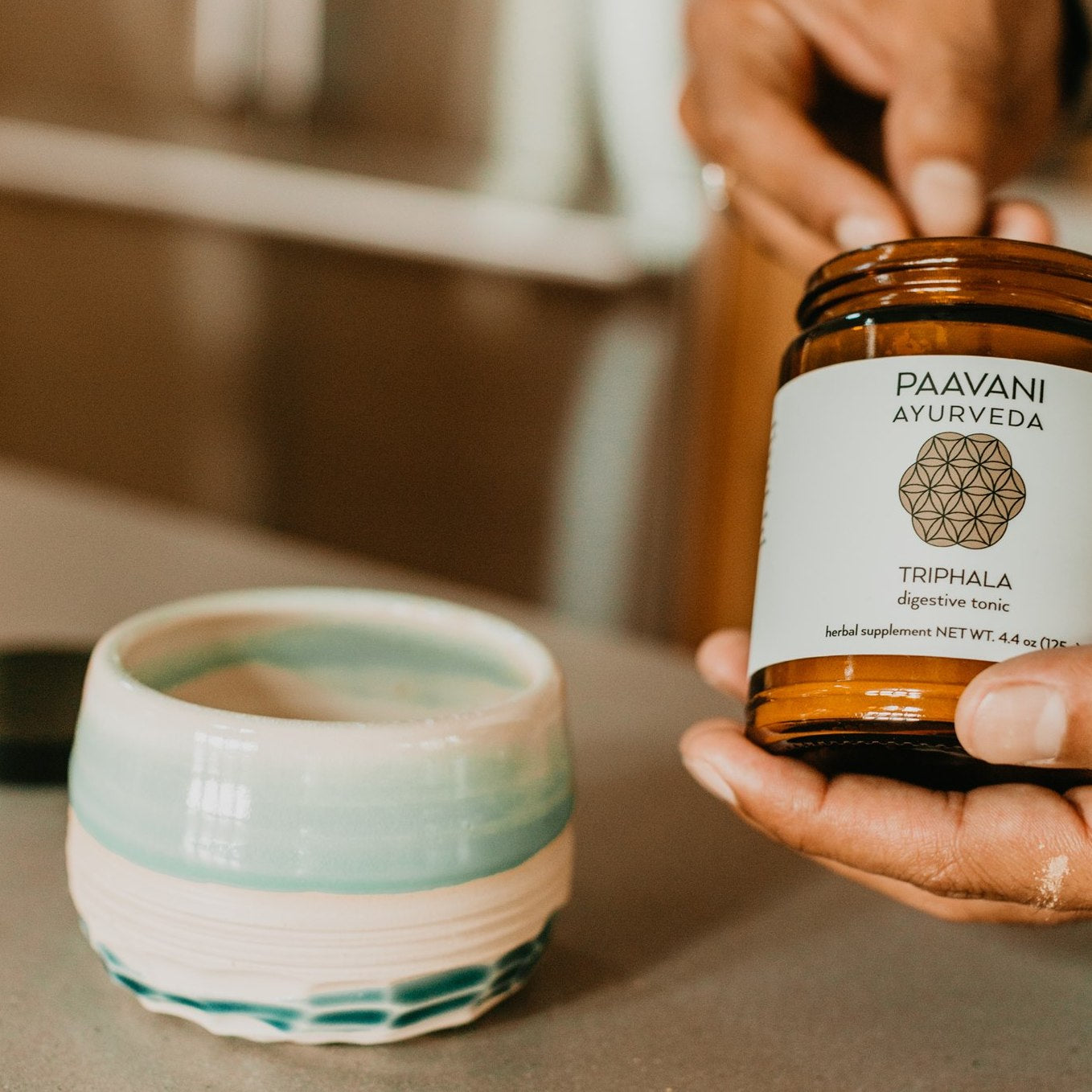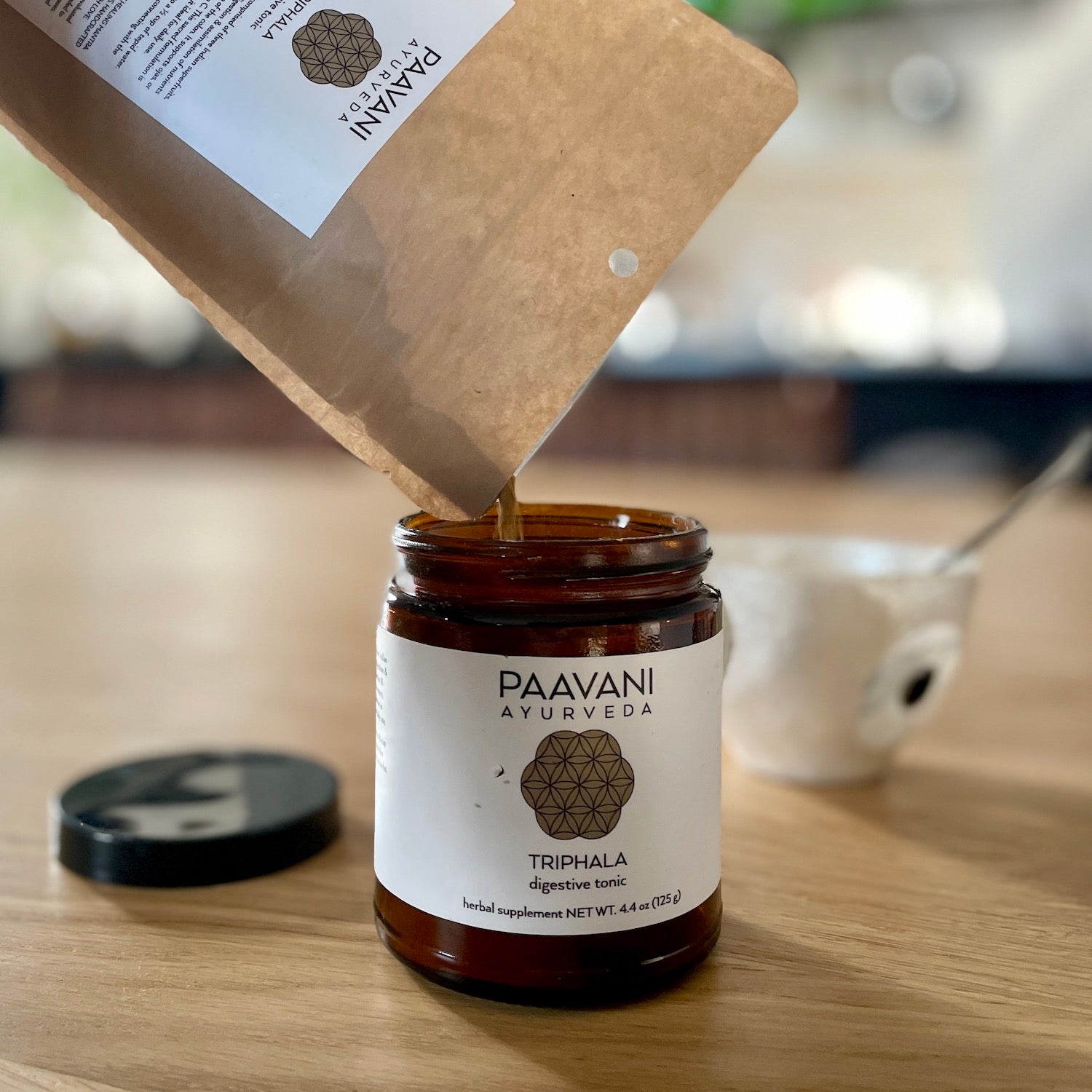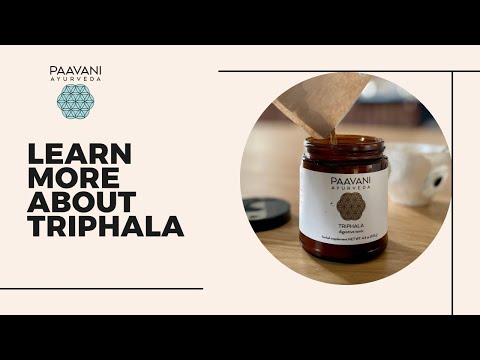DINACHARYA: YOUR GUIDE TO CREATING AN AYURVEDIC DAILY ROUTINE
Whether it is something that we would like to admit to ourselves or not, it’s true that our daily routines and habits (dinacharya) play an integral role in our long term health. Every decision made throughout the day impacts the way that we look and feel: the foods we eat, lifestyle choices we make, even the subtle thoughts we think. When it comes to making decisions to support our health it can often feel overwhelming. It takes awareness, discipline, and dedication to establish healthy habits that actually stick and that is why following an Ayurvedic self-care routine can be one of the best things you'll ever do for yourself.
Ayurveda, India's 5,000 year old medical system, empowers us to take our health into our own hands, by providing simple practices that can be easily implemented over time to ensure a happier, healthier life. Dinacharya is the Sanskrit term for daily Ayurvedic rituals which, when practiced regularly, help to support a life of optimal wellness through routine, detoxification and nourishment. When we are healthy and balanced, we are able to fulfill our dharma, our essential life’s purpose, allowing us to feel our best and share our gifts with the world. Dinacharya should be practiced first thing in the morning in order to maintain connection to the circadian rhythms of nature. Current fast-paced societal norms keep us disconnected from nature due to our constant access to electricity, reliance on handheld devices, pressure to make the most of our days, social media, and the numerous other disconnects we have become accustomed to having in our lives. Thankfully, through the ancient practice of dinacharya we can deepen our roots back to nature and begin to re-establish a connection with our authentic selves, while still enjoying the comforts and pleasures of the twenty-first century.
By implementing the fundamental self-care practices of dinacharya into your life (with the support of our printable daily routine guide) you will become equipped with the necessary tools to cultivate balance, bliss and overall long term health. Each of the following practices are discussed in the general order in which they can be implemented into your daily ritual.
DINACHARYA: DAILY MORNING ROUTINE
Best done between the hours of 6am-10am, during the kapha time of day, when you have the most strength, steadiness and fortitude.
1. Tongue Clean
Tongue cleaning or tongue scraping is the daily Ayurvedic ritual of gently scraping unwanted toxins and residue off of the tongue. This practice eliminates bad breath causing bacteria, draws toxins or ama out of the body, and prepares the digestive system by stimulating the taste buds. Traditionally, tongue cleaners are made from copper which provides a naturally, powerful antibacterial action. Copper tongue scrapers thoroughly cleanse and will last longer then plastic or stainless steel options.
DIRECTIONS:
Open your mouth and extend your tongue to inspect for a film or coating. Place the tongue cleaner towards the back of your tongue and gently scrape the ama or film forward and out of the mouth. Rinse the ama off of the tongue cleaner and repeat this process until you no longer see residue collecting on the tongue cleaner and your tongue is clean.

2. Oil Pull
You may have already heard of oil pulling, as it is currently becoming a health trend across the country. Many people are learning of the multitude of benefits that this simple practice can offer but are probably unaware of the fact that its roots stem from Ayurveda. Known in Sanskrit as kavala graha, oil pulling is the ritual of pulling or swishing oil through the teeth for twenty minutes to support overall oral health and hygiene. Perform this dinacharya every morning to strengthen gums, whiten teeth, eradicate plaque, rebuild enamel, draw toxins out of the body, eliminate bad breath and alleviate the symptoms of TMJ.
Many people enjoy the use of coconut oil as their pulling oil staple and we are in full support of this method, as coconut oil is easily accessible, has a pleasant taste, and has antibacterial and anti-fungal properties. However, we would also like to suggest the use of sesame oil as it is the preferred Ayurvedic oil for oil pulling due to its antibacterial, rejuvenative and highly nourishing properties. Traditionally, turmeric and other beneficial herbs are also infused into the oil to increase its medicinal value. At PAAVANI, we honor the traditions of old and new, by infusing whole herbs into both sesame and coconut oil in order to ensure the most effective oil pulling experience.

3. Brush Your Teeth, Floss & Massage Your Gums
These Ayurvedic practices are almost self explanatory: brush your teeth and floss. We recommend flossing your teeth in the evening prior to bedtime to remove any food debris, harmful bacteria, and plaque before you sleep. One less common practice is to massage the gums.
Studies have shown that massaging the gums daily with sesame oil reduces oral counts of Streptococcus mutans and Lactobacillus bacteria, both responsible for tooth decay and plaque. Sesame oil reduces bacteria's ability to adhere to the teeth and gum surfaces, while massaging the gums improves circulation to the gum tissue which helps our ojas or immune system to stay strong.
DIRECTIONS:
Place a few drops of pure, organic sesame oil or PAAVANI Pulling Oil onto your clean index finger. Massage the gums in a gentle circular motion, starting from the back of the mouth to the front. Re-apply oil as needed. Massage the gums for 10 minutes and then expel oil residue into a trash bin and rinse your mouth with lukewarm water.
4. Drink Warm Lemon Water
Drinking a glass of warm lemon water is the perfect way to jumpstart your day. Ingesting this prior to any other beverage is recommended in order to initiate agni, or digestion, and prepare the body for elimination (bowel movement). Many people also find that drinking warm lemon water on an empty stomach aids in weight loss, since it increases the body’s metabolic rate.
Lemon is anti-inflammatory and helps to alkalize the body. Lemon is also high in Vitamin C, so this dinacharya practice helps to keep the immune system healthy and free from infection. Lastly, warm lemon water flushes out the liver, detoxifies the entire body and can improve skin tone and complexion.
DIRECTIONS:
Heat water in a kettle and pour ½ cup into a tea cup or mug. Add ¼ tsp of freshly squeezed organic lemon juice. Sip and enjoy!
5. Eliminate
Ayurveda has a pleasant way of talking about your bowel movements, by referring to it as elimination. Making time for elimination should most definitely be apart of your dinacharya routine. According to Ayurveda, having 1-3 bowel movements per day is considered healthy and regular, so if you are not having a bowel movement daily, it is time to take action.
One of the most interesting things we’ve learned while studying Ayurveda is that if you are not eliminating daily, then you are experiencing constipation, which is considered a vata imbalance. When constipation occurs, it is because the body is dehydrated and is reabsorbing the water contained in your stool back into the body. The remedy for constipation is to add more healthy oils, like ghee, coconut or sesame oil, into your diet, drink more water and incorporate demulcent herbs like flax seeds, shatavari and licorice. We highly recommend our Hydrate Blend Tea to help retain moisture in the body and also daily intake of the classical Ayurvedic herbal formulation known as Triphala.
DIRECTIONS:
If morning elimination is not part of your daily routine, begin the practice of sitting on the toilet to allow proper time for elimination. When sitting on the toilet, it is best to mimic how the body looks in a squatting position. We know it sounds silly, but you may want to consider investing in a squatty potty or just perch your feet on the toilet seat to ensure that your knees are above your hips, which mimics a natural squatting position.
According to a Stanford University study, when one sits on the toilet, the puborectalis muscle, which is responsible for maintaining continence, only slightly relaxes. This makes elimination more difficult and many people use forceful pushing which can result in hemorrhoids, diverticulosis and constipation. In contrast, when one squats to eliminate, the puborectalis muscle can fully relax, smoothly releasing stool from the body.
6. Neti & Nasya
Ayurveda believes that the nasal passageway is the entryway for prana, our breath and life force energy, to enter the body via a direct route to the brain. This is why it is important to keep this vital passageway clean, healthy and clear via the use of neti and nasya in your daily routine.
The term neti literally means ‘to guide’ as Dr. David Frawley explains in his book, Neti: Healing Secrets of Yoga & Ayurveda: Neti “refers to the water that guides or draws our energy through the nasal passages, opening them up along the way.” For the water to enter the nasal passageways, you will need to use a neti pot.
Nasya is the Ayurvedic term for nasal therapy. Nasya oil can be used on its own or in conjunction with a neti pot to oleate and moisturize the nasal passageways. Traditionally, nasya oil is made from a blend of sesame oil infused with organic herbs that help clear, moisturize, and protect the nasal passageways and sinuses.

Aromatic Neti Salt | Herbal-Infused Mineral Rinse for Nasal Care
7. Self-Abhyanga
In Sanskrit, abhy means ‘to rub’ and anga means ‘limbs’ and together these terms define Ayurvedic massage. Thanks to the Ayurvedic practice of self-abhyanga, you do not need to wait for your next spa appointment to receive a massage! Self-abhyanga is the practice of anointing the body with warm oil using a mindful, loving touch and it has a multitude of benefits:
- Nourishes & hydrates the skin.
- Tonifies the dhatus, or tissues, of the body.
- Restores the musculoskeletal & nervous systems.
- Assists with detoxification of the lymphatic system.
- Aids in healthy sleep.
- Decreases the effects of aging.
- Increases circulation.
- Stimulates the internal organs.
- Restores apana vayu, or the downward moving energy, which assists in healthy elimination
When massaged into the skin, abhyanga oil penetrates deep within it’s tissues, having a potent effect on the body and mind. PAAVANI Body Oils come in four different options to meet the unique needs of each individual’s skin-type. Our Vata Body Oil is designed to hydrate and soften dry skin while providing a deep sense of grounding and warmth. The Pitta Body Oil is intended to soothe sensitive skin and/or inflammation, while cooling heated emotions like irritability, anger or resentment. Our Kapha Body Oil is best for oily skin, as it is formulated to absorb quickly and balance the skin’s natural oil production, without leaving a heavy, oily layer behind. It also helps to awaken and stimulate the senses. Lastly, our Tridoshic Body Oil provides balance to normal skin and imparts a feeling of calm to the body and mind.

8. Ear Oil
The practice of placing a few drops of warm oil in both ears is known in Sanskrit as karna purana. It is a simple, effective way to maintain the longevity of your hearing and the overall health of your ears. Karna purana pacifies certain imbalances often caused by excess vata accumulation and aggravation brought on by cold and windy weather, overstimulation and travel.

Karna Purana | Ayurvedic Ear Oil for Dryness & Discomfort
9. Asana
What we call yoga, here in the west are actually yoga asanas or postures. Ayurveda recommends practicing 10-30 minutes of doshic balancing asana in the morning to assist in increasing circulation, cultivating balance, improving flexibility and building strength in both the body and mind.
10. Pranayama
Breathing exercises are known in Sanskrit as pranayama. Prana is the breath, it is our ‘life force energy’ and ayam means ‘to control’. We need prana in order to fulfill our dharma and accomplish goals. We need ayam to control the breath, or prana, and direct our energy where we need it to go. When pranayama is practiced daily, the mind awakens, energy is cultivated and balance is maintained.
There are many pranayama practices to choose from and it is important to learn about the effects on each dosha prior to implementing them.

11. Meditation
Meditation is a simple yet profound practice which brings you into a present state of awareness where the body is calm and the mind is focused. Scientific studies have proven that meditation has a multitude of benefits:
- Reduces stress & anxiety.
- Diminishes depression & promotes a more positive outlook on life.
- Minimizes inflammation in the body.
- Builds connection with a strong sense of self.
- Develops self-awareness.
- Improves memory & focus.
- Increases mental discipline.
- Reduces pain in the body.
- Improves sleep patterns.
- Reduces high blood pressure.
12. Shower & Skin Care
Finally, it’s time to slip into the shower! A dinacharya that we are all already familiar with. This morning ritual needs no explanation, as cleansing the body is a universal practice; however, we can share some Ayurvedic tips on how to get the most out of your morning shower.
Rather than use a bar or liquid soap, which strip away the skin’s protectant sebum, Ayurveda recommends gently exfoliating the body with an all natural loofah and salt or sugar scrub. Since you already have oil on the skin from your morning self-abhyanga, any of the exfoliating tools mentioned will work well with the residual oil to simultaneously cleanse and nourish. At this time, we also recommend step 1 of the PAAVANI Skincare Ritual. Step 1 is the PAAVANI Cleanser & Mask. To activate, blend with the PAAVANI Floral Water to create a gentle facial scrub which will exfoliate and refresh the skin.
When your shower is complete, lightly pat dry with a towel and allow your skin to air dry, so that you can retain the remaining abhyanga oil as it continues to penetrate into the skin. Next is step 2. Mist your face with the PAAVANI Facial Toner which will continue to cleanse, nourish and balance the pH of the skin. Lastly, for step 3 blend 3-6 drops of PAAVANI Floral Water with your PAAVANI Facial Serum to protect, moisturize & illuminate your skin for the day ahead.

13. Breakfast
It is an important dinacharya to start your day with a balanced breakfast because you need the proper energy and nutrients to “seize the day,” as well as, stoke your agni or digestive fire. Moreover, what you eat becomes the building blocks of your dhatus (bodily tissues). Ayurveda explains that most disease begins in the digestive tract. A breakfast and overall diet rich in fresh, whole foods which are cooked and spiced according to one’s specific needs is crucial to prevent disease and promote health and wellness.
14. Tea
Sipping a digestive tea during your meal is a fabulous way to moisten food and stoke your agni. Digestive herbs called dipanas help strengthen digestion and metabolism. These herbs also help you absorb nutrients from food. It is important to note that Ayurveda does not recommend drinking ice cold beverages of any kind, even water, as this creates a low agni. When agni is low, it is difficult to digest food, causing digestive upset in the form of gas, indigestion or nausea.
Each dosha has particular dipanas which work well with its governing qualities. Since vata dosha and kapha dosha have a cool nature, it is best to counterbalance with warming, stimulating herbs. Likewise, it is best to ingest cooling dipanas for the heated quality of pitta dosha.
15. Eye Wash
Ayurveda recommends cleansing the eyes once per week in order to purify, soothe and maintain eye health. In this modern, tech saturated world, there is an over demand on our senses, especially our vision. More than ever before, we are spending time on screens of all kinds, be it for work or leisure. All of these devices emit blue light which when stared at too long creates eye strain, fatigue and dryness.

DINACHARYA: DAILY DAYTIME ROUTINE
10am-2pm: Pitta Energy
Ayurveda recommends that morning dinacharya be completed before 10am in order to follow the movement of the doshas throughout the day. Between the hours of 10am-2pm, pitta dosha is considered to be the strongest; hence, it is an opportune time to harness the heating, go-getter energy of pitta and be productive with work, chores, errands, etc. In short, whichever are your biggest tasks to tackle in the day, these are the opportune hours to get them done, for you will have sustained mental focus and clarity thanks to the qualities of pitta dosha.
It is also recommended to eat your largest meal of the day during this time, preferably around noon, as this is when the energy of pitta dosha is at its strongest and is the optimal time of day for the agni to properly digest & assimilate food.
During these peak pitta hours, Ayurveda also recommends avoiding direct sunlight, especially during a hot day and to avoid engaging in vigorous physical activity, as both may lead to an imbalance in pitta dosha.
2pm-6pm: Vata Energy
Between these hours, vata dosha begins to peak. Seeing as vata dosha is comprised of the air and ether elements, there is spaciousness and movement during this time of day that can be used for creative projects and problem solving. Allow yourself to think outside the box, as you may stumble upon a creative solution thanks to the energy of vata.
Since this is the time of day when your focus & attention may start to decline, avoid reaching for a sugary snack or caffeine break, as this can easily push vata dosha out of balance and overstimulate your nervous system. Instead, enjoy a grounding cup of Hydrate Blend Tea or Bliss Blend Tea and take an afternoon stroll outside to get fresh prana circulating in the body.
6pm-10pm: Kapha Energy
Kapha dosha predominates at this time of day and with that comes a feeling of heavy, grounding energy. Between the hours of 6-8pm, is the perfect time to enjoy a walk in nature or take a gentle yoga class like a Restorative or Yin Yoga to wind down your day. You will want to flow with the energy of kapha dosha at this time, surrendering to the feelings of fatigue from your long and productive day. There is no need to push yourself to do more at this time, for now is the time to ground and slowly prepare the body for rest.
DINACHARYA: DAILY EVENING ROUTINE
These are best done between the hours of 8pm-10pm, during the kapha time of day, when you feel fatigue & sluggishness from your productive day.
1. Take Triphala
Triphala is one of the most popular traditional Ayurvedic formulas. It is comprised of 3 fruits: haritaki, amalaki and bibhitaki. These superfruits have the unique ability to both gently cleanse and detoxify the digestive tract while also nourishing the tissues of the body. Try our Triphala Churna before bedtime to help establish a regular elimination pattern and balance the body.
Triphala | Ayurvedic Superfruit Blend for Digestion, Detox & Daily Elimination
2. Sleep
Proper sleep is one of the Three Pillars of Life in Ayurvedic medicine. Sleep is an essential time for healing the body from daily stress. As our minds rest during sleep the body is able to focus on digesting, metabolizing and regenerating. Not only do the tissues of the body replenish and heal, but our minds and emotions have an opportunity to digest and release stress, as well.
Millions of Americans suffer from chronic diseases like depression, obesity, hypertension and diabetes. An unhealthy sleep cycle can contribute to such diseases because our bodies and minds become more fragile without proper rest. Eventually, lack of sleep catches up with us, making us less productive at work and feeling less vital and alive.
So, what is considered proper sleep? Ayurveda believes that sleep patterns should be in accordance with the sun; thus, the best time to sleep is from 10 pm-6 am. As the sun sets, the pineal gland, located in the brain, receives information from the eyes that it is becoming dark and evening has arrived; thus, it is time for the pineal gland to produce melatonin, a serotonin derived hormone, which prepares the body for sleep. When we are still on our phones, watching television or have overhead lights on as evening rolls in, the pineal gland is unable to produce an appropriate amount of melatonin; thus, it becomes harder to fall asleep at 10 pm. Here are some evening dinacharya practices to help you prepare the body for sleep:
- Set the Mood - Turn off or dim all overhead lights in the evening. This way, your pineal gland can function optimally.
- No More Screen Time - Set an intention to turn off all screens by 8pm or 9pm. When you are exposed to this artificial lighting, your melatonin and circadian rhythms are disrupted.
- Be In Bed by 10pm - Restoration and regeneration of our bodies and minds, works most efficiently between the hours of 10pm- 2am; hence, you need to actually be in bed by 10pm in order to get your best rest. If you are up past 10pm, the metabolic energy that should be used to heal and regenerate the body transfers over to mental activity. This is the reason why you can sometimes experience a ‘second wind.’
Ayurveda understands that 10pm-2am is considered pitta time, and it is easy to become activated if we are not in bed by this time. So, what to do if you are currently getting to bed at midnight? Use the old 15 minute rule! Each night, get yourself into bed 15 minutes earlier than the night before. Soon enough, you’ll be willingly tucking yourself in by 10pm and making the most of the deep beauty sleep you receive during these essential hours of the night.
To learn more, click here to read, Ayurvedic evening rituals to ensure beauty sleep.Remember, a stress free morning begins the night before with proper sleep! Give your body between 6-8 hours of sleep each night, depending on your constitution. If you know your constitution or dosha, vata type folks do best on 8 hours of sleep, predominantly pitta types can operate well on 7-8 hours of sleep while kapha types can be fine with just 6-7 hours of sleep.
Ayurveda recommends these waking times for each dosha:
- Vata: awake with the sun
- Pitta: awake ½ hour before the sun
- Kapha: awake one hour before the sun

GETTING STARTED
Ayurveda is a holistic, traditional medical system which has the potential to heal deep rooted diseases, but to us, its most useful teachings are the ones that provide tools and insight into preventative care and medicine. Wouldn’t you rather invest in dinacharya self-care practices to promote optimal health and wellbeing, rather than allowing your health to decline? Disease prevention starts with the choices we make each and every day. Thus, it is important to consider the effect on your short and long-term health when making daily decisions.
Ayurveda translates to “the knowledge of life” and is truly a gift for all humankind. It teaches us to slow down and assess, reconnect with our body wisdom, tune into the circadian rhythms of the earth and cultivate greater self-love and understanding.
As you begin to weave Ayurveda into your daily routine, please keep in mind that it is motivation which gets you started but habit will keep you going. Our advice for successfully implementing dinacharya into your day is to commit to 1-2 self-care practices and stick with them for 2 weeks prior to adding another.
Remember, you want these practices to become habits, just like brushing your teeth. If you try to do this entire list all at once, you may become overwhelmed, lose your motivation and even feel like quitting. Instead, take the slow and steady route to create lasting healthy habits which will transform your life.
Wishing you much health, happiness and success as you begin your Ayurvedic journey!
To embark on your Ayurvedic journey, take our Introduction to Dinaharya Virtual Class for guided information on how to implement these Ayurvedic practices into your life &/or check out The Dinacharya Ritual Kit including all of the products you need to begin your journey into Ayurvedic Dinacharya!




